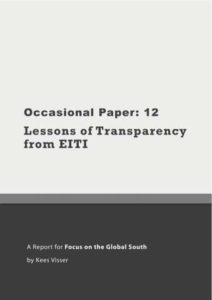24/08/2012
Under: Publications, Trade and Investment
Since first being announced a decade ago, the Extractive Industries Transparency Initiative (EITI) has been heralded as a revolutionary solution to corruption and related difficulties that extractive industries bring to developing countries. While it could be argued that the EITI provides information that can be useful for well-intentioned policy- makers and others, claims that the EITI provides levels of transparency that are needed to truly address corruption, let alone a device that can address larger problems presented by resource extraction, are grossly overstating EITI’s limited benefits. By limiting the discussion to transparency of government revenue and in-country company payments, EITI overlooks essential issues, from whether resource extraction is worth the human and environmental impacts, to how to distribute resource revenues. At the same time, given its voluntary nature and disregard of serious problems such as tax avoidance, theEITI fails to bring meaningful transparency into the resource industry. Unfortunately, rather than ending the “resource curse”, the EITI is primarily successful in deflecting criticisms away from the World Bank and the extractive industry while concentrating the burdens and the blame on the governments of resource-rich countries.




![[IN PHOTOS] In Defense of Human Rights and Dignity Movement (iDEFEND) Mobilization on the fourth State of the Nation Address (SONA) of Ferdinand Marcos, Jr.](https://focusweb.org/wp-content/uploads/2025/07/1-150x150.jpg)

